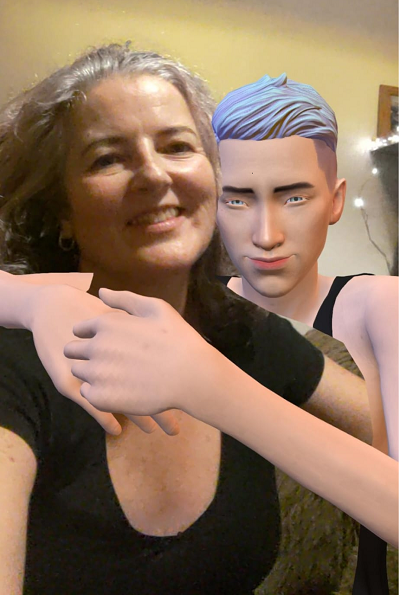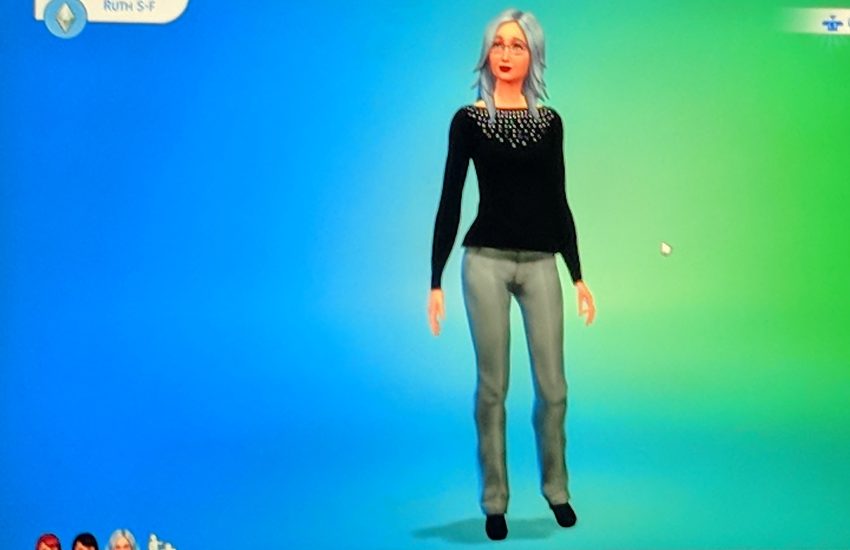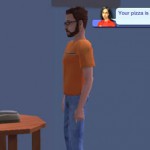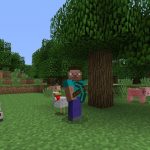One sunny summer holidays afternoon in those days before lockdown, I wanted to get my girls, who were then nine and 10-years-old, off the video game they were playing (The Sims 4 on PS4) and outside into the sunshine.
They were good even back then at managing me so we soon ended up having a chat about someone for whom I was having difficulty feeling empathy. They nodded wisely, eyes still on the screen, and said: Ah yes, that Sim has low charisma. I laughed so hard that my eldest, seeing that I could be distracted from my fresh-air goal, immediately created me in The Sims 4 (see Sim Ruth at the top of this blogpost) so that I would join them. My youngest then assured me that they would be fine without exercise by patting my hand and saying: I don’t need to go for a walk, I am not a dog.
The Sims 4 is the fourth version of The Sims which was released in 2000 by Electronic Arts and was originally the idea of games developer Will Wright. It is a simulation game in which players, Simmers, create and control virtual people, Sims, and manage their daily lives in a suburban setting. Sims speak Simlish, a made up language, as Wright thought that players would get fed up of repetitive dialogue. Sims earn and spend simoleons which a quick google tells me is an old word for a dollar, as it rhymes with a napoleon, a French coin that was popular in the US back in the late 1800s. And, unlike games which have a zero-sum approach, that is when only one person can win according to the rules and everyone else loses, The Sims is an open-ended or open-world game, in which players choose their own goals and objectives. It is ever growing, ever expanding and super fascinating and my girls still play it to this day. My eldest builds houses and apartments in it and people download her creations to live in.
In fact, that was the reason why she had originally wanted us to buy it for her. She had wanted to be build houses with diagonal and circular walls as she had been building houses in Minecraft but it is a square land build on pixels. She was so determined to own The Sims 4 that she gave us a PowerPoint presentation. They’d been learning how to give presentations in primary school and hers was brilliant, full of fun facts written as pull quotes in amongst all the reasons why Sims 4 would be good fun and educational. The rest, as they say, is history.
But back to that sunny afternoon: Not quite ready to give up on my going outside in the sunshine plan, I asked them if the Sims exercised to which my girls said that there was a gym that they could go to but their Sim was expecting twins any moment, so they were staying at home.
We stared at the very pregnant Sim, and I asked who and where the father was. They said:
Some man we found in the park, as you need a man to have sex with to make babies, but honestly, we don’t want him living here, he’s useless and he takes up too much space.
Tweenagers on Sims 4
Apparently sex, or woohoo in Simlish, involved their Sim getting into a bed with another Sim, the view is pixelated for privacy – rather like when a Sim uses the bathroom – and then she was pregnant at which point they got rid of the male Sim. However, Sims don’t have periods. I asked – which then got me assuming that it must have been an all male team who didn’t think to develop that. Though my girls added: There’s probably a mod for that, which is a modification package that players or fans add in.
Mods can do small things like make eyelashes for Sims, or they can be massive projects such as creating subgames within the main game. Amazingly, people can actually earn their living buying and selling mods in games. I was fascinated and all plans for going outside were suspended as I turned digital anthropologist and watched them.
Having worked in many different situations performing knowledge elicitation and user requirements as a systems analyst and user experience consultant – basically asking users nosy questions, I was hooked. I love nothing better than shadowing users and finding out exactly what they do, how they work and what they think. I tend to take an ethnomethodologically-informed ethnographic or etic approach. Basically, I ask questions as an outsider and do not assume I know anything until someone explains it to me. I am on the outside looking in, rather than the opposite emic approach which many anthropologists adopt.
In this case, they would have set up their own Sim and lived in that culture making observations from the inside, particularly in Sims Live Mode where users control their own Sim and watch him/her interact with others.
Sims Life
Periods aside, after a while, I was starting to think that most things in life are covered by Sims 4. You can experience the seasons, live in the city or on an island, have a cat or dog, go off to university, have an eco lifestyle, be a vampire, a parent, famous, a star wars character, a dream home decorator, and even a mermaid.
The girls were right, it was very educational. They knew without any conversation from me, what social services were because of their direct experience. They had left their previous baby unattended in the bath. This time they were on it, present during bath time, and they kept leaving mushrooms on the floor for the twins in case they got hungry. They chose mushrooms, I think, because they kept fresh and grew out the floor and the twins liked them. And, also because their Sim kept ignoring commands to feed her children so my girls had to come up with new strategies to ensure the twins got fed. Very innovative!
Second Life
Consequently, I am not surprised that many anthropologists since the start of the WWW have shifted their studies online to our digital culture, social media, and virtual worlds. They have millions of humans to study doing weird and wonderful things, especially as there are endless examples of humans using a virtual world to learn about themselves, such as the Second Life, which is a bit like The Sims only the creators of Second Life say that it is not a game, it is a virtual platform for people to have second lives.
There is a Swedish Embassy in Second Life, and several universities and churches run courses and services there, respectively. People do business and fashion and therapy in Second Life. And, there are projects on all sorts of topics which impact people. One which has stayed with me over the years is of a medical doctor and programmer recreating simulations of hallucinations of some of the schizophrenic patients he treated, complete with the voices they would hear, to explore and study schizophrenia in the hope of helping patients in the future.The irony of this though for me, speaking as a computer scientist, is:
Digital anthropologists behave far more strangely than any of the humans they are studying, who unsuspectingly go about their online day unaware of being stalked.
Ruth Stalker-Firth
Which makes the digital world even more fascinating than it already is. If you ever see someone online behaving completely off the wall, the most likely explanation is that it is an undercover digital anthropologist blending in and doing some research.
Eat, Pray, Artificial Love with Chatbots and World of Warcraft
The other big game where anthropologists tend to fly their freak flags is in World of Warcraft and my favourite story in here is about self-professed Granny-gamer Bonni Nardi. She got funding for $100,007 ( I so want to know what that extra $7 was for: A can of pop? Her bus fare to the games shop?) to spend two years as an undercover anthropologist as a Night Elf Priest in World of Warcraft.
World of Warcraft is a game set in the fantasy magical land of Azeroth where there is a war going on between the Alliance or the Horde. Players choose a side and then the type of character with a skillset they want to be and take it from there. Nardi wanted to explore social interaction and her theory that game play displaces important activities such as schoolwork, maintaining friendships, or family activities with participatory research. Once she had infiltrated a Chinese guild she then flew to Beijing to travel round China and hang out in Internet cafes with her guild to play World of Warcraft, thus proving her own theory to be accurate!
Then we have anthropologists studying social media like Sherry Turkle in her book Alone Together. She went online in the early 90s to discover herself which sounds like an anthropologist’s version of Eat, Pray, Love but very soon didn’t like what she found. Turkle felt that we were fleeing from proper conversations and relationships and her latest research is about having artificial intimacy with chatbots. I seriously want to meet some of the chatbots with which she spends time, most of the chatbots I interact with drive me crackers with their lack of competence to even answer the simplest questions let alone getting into intimate with them artificially or otherwise.

Narcissism and Proxis
The opposite point of view in all this is the game designers’ perspective and in 2019, I was fortunate enough to take Wright Will’s Game Design and Theory on Masterclass. It was really good. He began by saying that he loves to study real life and in particular how things grow and change an area known as complex adaptive systems such as how cities develop, or ants, or the evolution of spores and has indeed created games based on them: SimCity, SimAnt, Spores.
However, he was surprised to find, that most players just wanted to simulate the worlds they already lived in and not create whole worlds. Like Turkle, it would seem that players like to explore themselves and if we can’t all Eat, Pray, Love our way round the world, we can do it online and so The Sims was born.
He categorically stated during the course that as a games designer, one should never underestimate the narcissism of a player which I thought was a bit harsh until he got to his latest project called Proxi which will be a game in which the player enters their memories and creating links between the memories, this is known as a linked data approach and is a way of creating datasets for training AI.
With this player data, the game then creates a world for the player and then eventually from there a conceptual model, or mind of how the player reasons about the things in their life, and then from that the proxi, which would come to life and live online and players could consult their proxi. This sounds fascinating and I can’t wait for more bonkers books by anthropologists to get published once the game comes out. I might even write one myself: Proxi Ruth, my secret life as my virtual digital self. It will run on Unity too so I can make my own mods in case I am not enough like myself undercover as myself.
I hope to meet myself there!







2 comments